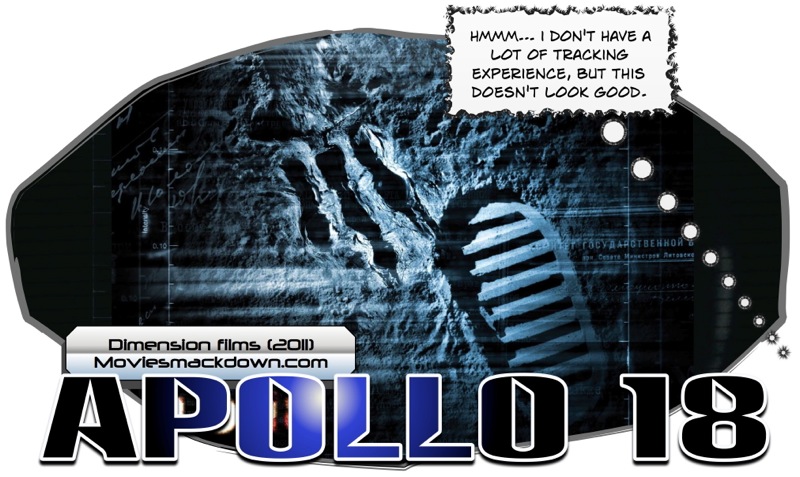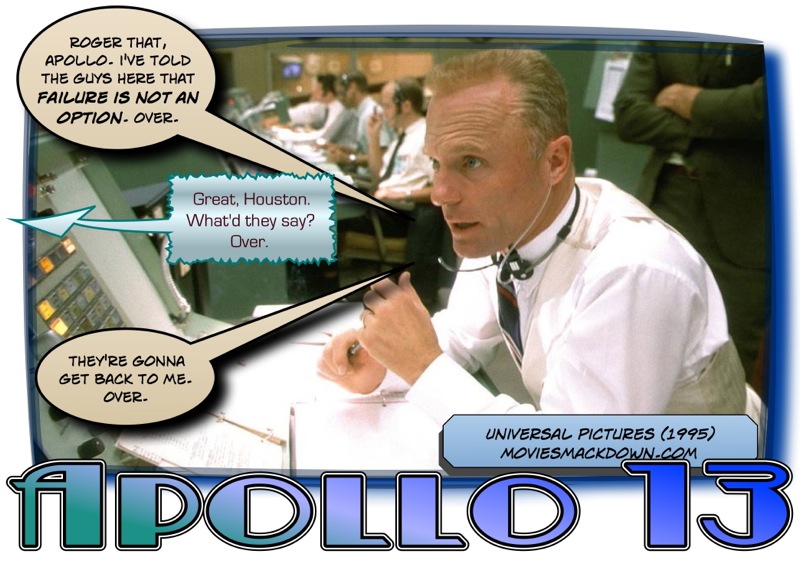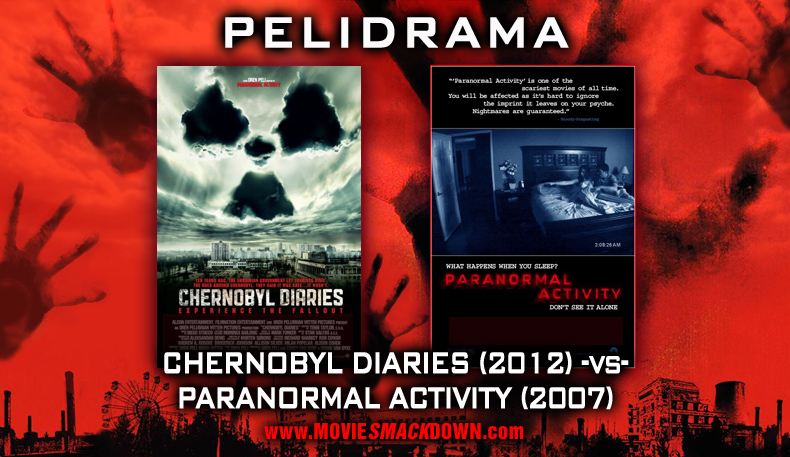
 The Smackdown
The Smackdown
Probably the only good way to look at NASA these days is in the rear-view mirror of past accomplishments, given that the agency seems to have lost its way. After all, it’s ended the manned space missions of the Space Shuttle program with no clear replacement in site. There is no grand new mission like going to Mars, just the past-tense glory days of going to the Moon.
But before we get too nostalgic here, we have a Smackdown to remind us that space is not always a triumph. Sometimes that cold vacuum of nothingness can force a human to look straight into the eye of death. And, as Elton John reminded us in Rocket Man, “It’s lonely out in space.”
The new Apollo 18 is a fictional story about a manned space mission to the moon that you never heard about. NASA officially pulled the plug on Apollo after 17 missions. So this one is right out there in conspiracy theory heaven. And the other film, Apollo 13, is about the NASA’s greatest near miss with disaster that could easily have landed the astronauts involved into the history books with the crews of the Challenger and Columbia or the doomed Apollo 1 mission.
 The Challenger
The Challenger
Why did we give up on going to the moon? Why have the United States and other nations avoided repeating something that was technically achievable since 1969, more than 40 years ago? Let’s let a certain Secretary of Defense weigh in:
There are known knowns; there are things we know we know. We also know there are known unknowns; that is to say we know there are some things we do not know. But there are also unknown unknowns — the ones we don’t know we don’t know.”
~~ Donald Rumsfeld, 2002
Apollo 18, the movie, is all about an “unknown unknown” that has been covered-up for more than four decades but in reality — or at least, in this reality — is about to be exposed in a movie theater near you. Let’s review the “known known” first, namely that Apollo 17, launched December 17th, 1972 was the last manned mission to the moon.
This is a found-footage movie that claims to have found decades-old images from NASA’s abandoned Apollo 18 mission, where two American astronauts were sent on a secret expedition in December of 1973, a mission funded by the US Department of Defense in the throes of the Watergate era. Even in the publicity for the film, Harvey Weinstein claimed they never shot any film, that it was all the real stuff that they discovered. Right.
Hype aside, the film that Harvey didn’t shoot shows a slow unfolding of terror on the moon with two astronauts getting increasingly scared by what they are experiencing. They aren’t the first to set foot in these parts, not by a long shot. First, there are traces of Soviet cosmonauts who met an ugly fate. Then there is, well, something else.
The film’s release date  has been pushed back multiple times, and the studio didn’t allow reviews until the day it opened. Now there’s a cover-up you can sink your teeth into.
 The Defending Champion
The Defending Champion
Apollo 13 is not only a riveting disaster story but, as pointed out, it has the added bonus of being true. Our “known known” here is that in April 1970, after two successful moon missions (Apollo 11, Apollo 12), Apollo 13’s Jim Lovell (Tom Hanks), Fred Haise (Bill Paxton) and Jack Swigert (Kevin Bacon) were on their way to the moon when an oxygen tank exploded. The immediate bottom line was that they would die in space poisoned by their own carbon monoxide as the oxygen ran out, or they would freeze to death.
It was only because the astronauts were steely-eyed test pilot types and NASA refused to give up that they lived. Flight controller Gene Kranz, brilliantly played by Ed Harris, delivers the famous line about failure not being an option, and the clock starts ticking.
Eventually, they come up with a risky plan to shut down power in the space capsule and move the astronauts in the LEM (Lunar Exploration Module), using it in a way it was never intended, as a space-faring lifeboat. But, of course, they’re running out of oxygen and even if they make it back to Earth alive, which is not guaranteed by any means, they still have to make a return to the Earth’s atmosphere at just the right angle or, instead of freezing in space, they’ll just burn to death on the way to the ground.
The stakes in the film are very, very high.
The Scorecard
Two films about Apollo moon missions gone terribly wrong are in the ring. One of them is true and the other pretends to be true. Both are shot with an almost documentary precision.
Oddly, Apollo 13 — in a logic backflip — supports the underpinnings of Apollo 18. When James Lovell in Apollo 13 gives a tour of NASA he tells people that they have a computer that fits in one room that can send out “millions of instructions.” This means that today all our technology, metals, computers and so on would make the stuff we used to get to the moon look like nothing at all. Which means… we could get to the moon again easily but, for some reason, we choose not to. Apollo 18, anyone?
When you consider Apollo 18, it may help to think of it as The Blair Witch Project on the moon. The crudeness of its filmmaking is meant to be part of the attraction. In fact, its style overwhelms its thin story, and as you sit in the theater waiting for something bad to happen, you find yourself thinking about how much more appropriate it was to shoot a film like this for a group of kids with no money than it is for a studio that should know better.
If you lived through Apollo 13 and its high-wire global tension, you know how it ends. If you did not, you may have some doubts. Either way, director Ron Howard wrings all kinds of tension out of smaller and smaller details. This isn’t true for Apollo 18 which has its moments but, Harvey Weinstein to the contrary, never actually feels like it’s real. We know it’s a movie because highly trained astronauts keep doing incredibly stupid things, and when the key parts of it are out-of-focus, we know something’s being kept from us for scary effect, not because those astronauts on the moon couldn’t focus the camera right.
Let’s talk actors. Apollo 13 is made in that period when Tom Hanks could do no wrong, and he shows why in this film. He’s lean and confident, just the way we might imagine the real Jim Lovell was. You put him up there in space with Bill Paxton and Kevin Bacon with all three guys knowing they may not come home, and instead of freaking out, they just work the problem. In Apollo 18, the problem works the characters, and they lose their cool the way most of us probably would.
The Decision
Maybe it helps to have lived through the real drama of Apollo 13 to fully appreciate the ride of the film version. It takes you back and gives you insight you never had. It feels authentic. By contrast, Apollo 18 is, at best, a genre film. It falls short of achieving what its predecessor did in the ’90s, which was to bring a national memory to vivid life.
But does it deliver on its own promise as a quick and dirty horror thriller? Unfortunately not. Because its “found footage” conceit prevents us from really getting to know or care about its characters, it plays more like a grim processional, with its small cast moving inexorably toward an unhappy fate that everyone can see coming but them. Apollo 13 is not only the better film, it’s actually the scarier film, and it wins this Smack outright.




Apollo 13 was real? Guess again. Apollo 13 WAS Apollo 18. Instead of a secret mission, the mission is publicized all over the globe – just not the gruesome details of why the disaster really happened. After the Apollo 13 astronauts land on the moon, collect rock samples, lift off, and re-dock with the CSM (Command Service Module) in Lunar Orbit (LOR), the rock entities wreak havoc in the CSM, blowing the oxygen tanks. Because the LEM (Lunar Excursion Module), the astronuats life boat, is underweight (no moon rocks to tote back to earth), they shallow up in the reentry corridor causing a much longer than normal communications black out period during re-entry into the earth’s atmosphere. THIS IS ONLY CONJECTURE AT THIS POINT.
Bryce:
It appears that you were incredibly easy on Apollo 18 — I think Harvey owes you a steak dinner…
Bryce..
It says everything when the releasing studio won’t show a movie before it officially opens. I think you’re probably right that Apollo 13 “… is not only the better film, it’s actually the scarier film…”
Clearly, Apollo 18 needed to be more than a lunar home for a variation of The Blair Witch Project.
That entire approach is so played out.
The quote from Donald Rumsfeld offers a useful frame of reference. Very well done!